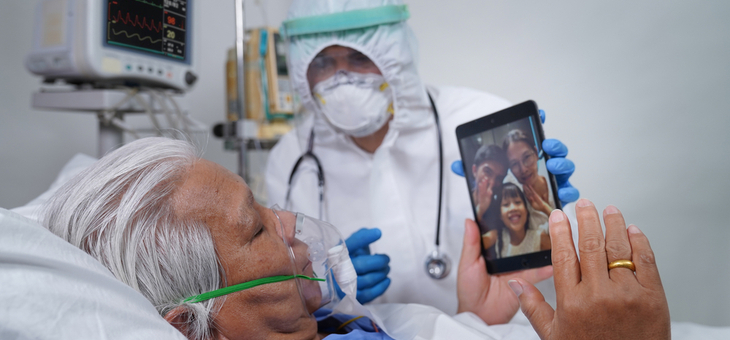Deaths in NSW and Victoria from the current Delta outbreaks continue to disproportionally affect older Australians, and now scientists believe they have discovered the reason why.
While it has long been assumed that older adults were dying from the disease in greater numbers because of increased occurrence of co-morbidities or frailties to do with their age, researchers from the Berlin Institute of Health have hit upon a new theory.
They have released a study that suggests prior exposure to coronaviruses associated with the common cold enhance the immune response, but that this ‘cross-reactive immunity’ decreases with age.
Read: States slam federal government’s unfair vaccine distribution
Last year, these researchers were the first to report that individuals with no prior exposure to SARS-CoV-2 nonetheless had immunological memory cells capable of recognising the novel virus.
The researchers concluded that these ‘T helper cells’ must have been generated to deal with mostly harmless common cold coronaviruses and that, thanks to the structural similarities between coronaviruses (in particular the characteristic spike protein found on their outer surface), these T helper cells will also attack the novel coronavirus.
This ‘cross reactivity’ hypothesis has since been confirmed by a range of studies.
Read: PM accused of ‘appalling judgement’ over Sydney lockdown visit
Dr Lucie Loyal explained that whether or not these immune cells would affect the course of subsequent SARS-CoV-2 infections was a hot topic among scientists.
“Our assumption at the time was that cross-reactive T helper cells have a protective effect, and that prior exposure to endemic coronaviruses therefore reduces the severity of COVID-19 symptoms,” Dr Loyal said.
“However, the opposite could have been true. With some viruses, a second infection involving a similar strain can lead to a misdirected immune response and a negative impact on clinical course.”
Read: Bickering between feds and states puts national plan in doubt
According to the data in the current study, cross-reactive immunity could be one of several reasons for the variability in disease severity seen with COVID-19 and might also explain differences in vaccine efficacy seen in different age groups.
The study involved nearly 800 participants who had no prior exposure to SARS-CoV-2 and then tested them at regular intervals to find those who had contracted the infection. Out of this total, 17 people returned a positive test at some stage after they were first recruited to the trial from around mid-2020.
They then studied the immune response of those 17 individuals in detail and found that their immune response against COVID included the mobilisation of cells that had been generated in response to endemic common cold viruses.
“During infections with the more harmless coronaviruses, the immune system builds up a kind of protective ‘universal coronavirus’ memory,” explained study co-author Dr Claudia Giesecke-Thiel.
“Once exposed to SARS-CoV-2, these memory cells are reactivated and kickstart the response against the new pathogen. This could help accelerate the initial immune response to SARS-CoV-2 and limit viral propagation during the early stages of the infection and is therefore likely to have a positive effect on the course of the disease.
“This does not mean that prior exposure to common cold viruses will definitely protect an individual against SARS-CoV-2, nor does it change the course of the pandemic,” she said.
“It in no way diminishes the importance of getting vaccinated. Our study provides one of several explanations for an observation made since the beginning of the pandemic, namely that the symptoms of SARS-CoV-2 infection can vary greatly between individuals.”
In a second part of the study, the researcher analysed the helper cells in approximately 570 individuals and were able to show that cross-reactive immunity declines in older adults.
According to the authors, this decline in cross-reactive immunity is caused by normal, age-related changes.
“Infection with an endemic coronavirus represents a benefit in younger people, helping them fight off SARS-CoV-2 or develop immunity following vaccination. Sadly, this benefit is less pronounced in older adults,” explained Professor Andreas Thiel, one of the researchers in the study.
“It is likely that a third (or booster) dose would be able to compensate for this weaker immune response, ensuring that members of this high-risk group have adequate immunity.”
Have you received both of your vaccination shots yet? Are you worried the government will botch its rollout of booster shots when they are required for older Australians? Why not share your thoughts in the comments section below?
If you enjoy our content, don’t keep it to yourself. Share our free eNews with your friends and encourage them to sign up.

